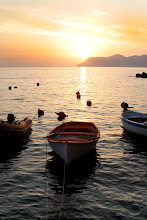
We’ve been doing some research on sleep sacks, which are basically sleeping bags made out of the thin material that sheets are made out of. We’ve never owned one but we have had heard many people recommend them when sleeping in hostels because the sheets aren’t always the cleanest and you might find a musty-smelling blanket or see a stray hair that doesn't belong to you on your pillow. (Although the truth is there is a danger of sleeping anywhere, as proven by Scott's previous travel buddy who got fleas while sleeping on a train in Spain and was forced to wash all her clothes and rinse her backpack out.)
Sleep sacks are mainly made of cotton or silk. Cotton is much cheaper (around $20) but is also larger and heavier than silk, which costs around $50. The sacks provide little warmth, but they can be handy to have in addition to the blankets provided by the hostels.
Many Web sites selling the sacks will warn that many hostels ‘require’ such an item, which is a big lie fabricated in order to get you to buy their product. Some hostels charge a couple of bucks to rent sheets, but they will alert you of this on their Web site before you book. Plenty of hostels don't charge, so there is no reason to pay for linens if you simply take the time to check on their list of amenities.
While there are exceptions to every rule, Europe has some of the cleanest hostels in the world. Therefore, you might be more inclined to invest in a sleeping sack if you are heading out to Asia or South America. Only you can decide what works with your budget and amount of space you have in your backpack. The cheapest method would be to grab an old sheet you already own and have your grandmother sew it into a proper sleeping sack. If you decide you don’t need it along the way you can drop it in the garbage or give it to a bum.
Many people take sleeping bags, which provide warmth in addition to a clean surface. We’ve slept on train station floors, airport sidewalks, benches, parks, and in every form or transport and never once wished we had a sleeping bag. (Well, we may have wished for one but then retracted that fantasy when thinking about how much a sleeping bag weighs.) Some experiences have been colder than others, even during summer months, but we always make it through the night by throwing on some extra layers and grabbing some cardboard to lay on. The bums know best and this method makes the ground seem much more appealing. A piece of advice – smell the cardboard first so you don’t have your face in an old potato or meat box all night.
With as often as your backpack is thrown around, locked up, and put under a plane or bus, it’s much easier not to have stuff attached to the outside. The bottom line: only take a sack or bag if you plan on sleeping on the ground or camping a lot, or if you know you will be traveling during the coldest months of the year.

















